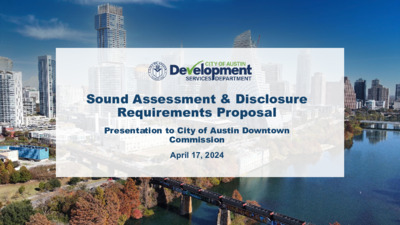Item #5 Presentation on Sound Assessment and Disclosure Requirements Proposal - Development Services — original pdf
Backup

Sound Assessment & Disclosure Requirements Proposal Presentation to City of Austin Downtown Commission April 17, 2024 Background • Council approved Resolution No. 20181018- 038 directing the City Manager to propose programs, rules, and ordinances necessary to improve compatibility between residents, lodging establishments, and music-related businesses. • The resolution was part of Council efforts to support music, arts and culture. Purpose • Policy related to residential development responsibility is still outstanding. • In addition to the sound ordinance and enforcement, the sound management system should also anticipate and address quality of life issues for residences in proximity to nightlife and entertainment establishments and districts. Ensure Accurate Expectations Policy Goals • Improve compatibility between entertainment uses with amplified sound and residential and hotel uses. • Anticipate, plan for, and minimize common conflicts between residential and hotel uses and entertainment-related amplified sound. • Ensure residential and hotel development projects understand the sound levels in the area so they can design and construct the building considering the sound impact from nearby code-compliant entertainment uses. • Provide residential development projects and new residents with accurate expectations about the level of sound that will be present in the environment, and the information they need to make informed decisions. Approach A commonsense solution that is not prescriptive and focuses on education and awareness Sound Assessment & Disclosure Requires residential and hotel developments near Outdoor Music Venues and Performance Venues to: • conduct a sound assessment • disclose to future residents when they sell or lease units about the presence of nearby venues, and that a sound assessment was conducted Description and Intent • Does NOT mandate building standards. • Requires residential developers to: Promotes Education and Informed Decisions 1. document that they have studied the sound levels in the area they are building. • This includes assessing the impact of legally compliant sound from nearby music and nightlife establishments. 2. disclose to future residents the presence of nearby music and nightlife establishments, and that a sound assessment has been conducted. Description and Intent • Residents are encouraged to ask questions about sound mitigation efforts, make informed decisions Promotes Education and Informed Decisions • Does NOT require anything further from Outdoor Music Venue Permit Holders or Performance Venues. • Their sound level is already regulated with a fixed sound level standard that is appropriate for the context, is predictable and doesn’t change when new residential is built nearby. Recommendations • Require new residential (requiring a site plan) and hotel/lodging development projects within 600’ of an establishment with an Outdoor Music Venue Permit (OMV), or within 300’ of a Performance Venue: Sound Assessment & Disclosure Details 1. Conduct a sound assessment that at a minimum documents the current sound conditions at the site and assesses the projected sound level inside the residential units. 2. Provide a disclosure when units are sold or leased, and when the building is sold, regarding the presence of permitted OMV establishments within 600’ and performance venues within 300’ of the building, and that a sound assessment was completed. Sound Assessment Criteria • The sound assessment should be conducted • For a live performance venue: during a performance. • For a bar or night club that's not centered on performance: during peak hours. Clarifications • The changes would NOT impact projects submitted for plan review prior to the effective date. • The changes are NOT retroactive and would not apply to a previously approved building. Implementation Simple Certification Process with No Staff Review • Sound assessment requirement added to site plan checklist • Mapping tool created for easy identification by applicant and • staff If the sound assessment is required: • Applicant completes it during site plan review process • Applicant submits a certification that the assessment was completed • Staff ensures that the certification has been submitted Implementation Simple Certification Process with No Staff Review • There is no staff review of the sound assessment • There are no required applicant responses or mandated building standards by the applicant • Applicant provides the disclosure when units are sold or • leased If the triggering venue(s) are no longer present in the future, the disclosure is no longer required Next Steps (Virtual) Timeline* • March 27 - Public information/feedback session (In Person) • April 1 - Presentation to Music Commission • April 3 - Public information/feedback session • April 15 - Presentation to Arts Commission • April 17 - Presentation to Downtown Commission • April 22 - Presentation to Design Commission • May 30 - Presentation to City Council • October 1- Changes go into effect *subject to change Q & A Public Input (closes 4/23)